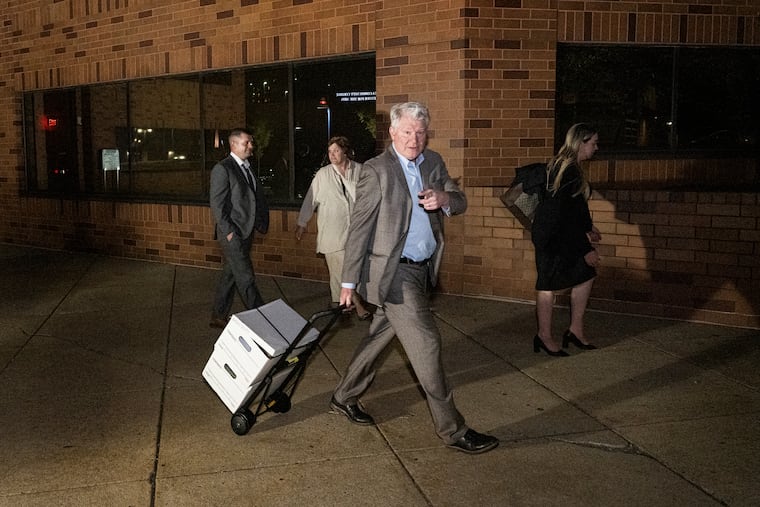A judge has declared a mistrial in John Dougherty’s extortion trial. What happens now?
While the uncertainty of a retrial on extortion charges looms, the former labor leader still faces the likelihood of a significant prison sentence in July on his two previous convictions.

Former labor leader John Dougherty’s federal extortion trial ended in a mistrial late Thursday after jurors declared they were hopelessly deadlocked and unable to reach a unanimous verdict.
So, what happened, and what comes next?
Why was the mistrial declared?
Jurors sent at least two notes to U.S. District Judge Jeffrey Schmehl saying their deliberations were at a stalemate — the first coming just hours into the first day of their discussions.
Though both times he urged them to keep trying to break the impasse, after 11 hours spanning well into the evening, the judge ultimately took the panel of six men and six women at their word and accepted their conclusion that any further debate would prove fruitless.
Based on the eight-day length of the trial and on the hours jurors spent talking on Thursday, Schmehl said he felt it was appropriate to declare the jury hung and the case a mistrial after a single day of deliberations.
» READ MORE: Mistrial for ex-Local 98 leader John Dougherty, nephew as jury deadlocks on extortion charges
“The court believes that based on these responses, that [the jury] cannot agree,” the judge said.
Will prosecutors retry the case?
We don’t know yet. Prosecutors did not immediately say whether they planned to retry Dougherty and his nephew, Greg Fiocca, on the 19 conspiracy and extortion counts. They declined to comment as they left court Thursday, and a spokesperson for the U.S. Attorney’s Office said Friday that it had no updates to provide.
Several considerations play into a prosecutor’s retrial decision including the cost of trial, the severity of the crimes, the chances of success, the availability of witnesses, and the willingness of victims to undergo the often arduous process of drawn-out proceedings again.
Regarding Dougherty, he’s already been convicted in two other cases — a 2021 bribery trial alongside former City Councilmember Bobby Henon and an embezzlement case last year, in which he and others were accused of siphoning hundreds of thousands of dollars from the coffers of his union, Local 98 of the International Brotherhood of Electrical Workers — and awaits sentencing July 11. Prosecutors could view those convictions as providing a sufficient level of justice.
That said, Schmehl on Friday set a June 24 date should the government opt to retry the extortion case.
Still, attorneys for Dougherty and Fiocca said they hoped the government would decide against it.
“For now, we’re happy with the result,” said Fiocca’s attorney, Rocco Cipparone. “We were hopeful for a not guilty, but we’ll take the hung jury at this stage.”
What was the split among the jurors?
That remained unclear. The judge did not poll the jury on the reason for its deadlock or to determine how they were split. Members of the panel were escorted out of the courthouse Thursday night by security staff.
What was the disagreement?
As deliberations wore on, jurors asked the judge several questions, including one focused on a legal defense — recognized by a 1973 U.S. Supreme Court decision — that allows labor officials to use economic threats or force as negotiation tools to achieve legitimate union objectives.
In this case, Dougherty maintained that’s exactly what he was doing when he threatened in August 2020 to potentially pull workers from a construction site after his nephew, a union electrician, clashed with a contractor over unpaid wages. The union chief, defense lawyer Greg Pagano said, was doing what he would have done for any other member of his union embroiled in a dispute over pay.
But throughout the trial, prosecutors sought to show that Dougherty had no legitimate union objective in mind when he threatened that contractor with economic harm. Instead, they said, he was only looking out for his nephew — to the detriment of other members of Local 98 who would have lost work had they been pulled off the job.
What does this mean for Dougherty?
While the uncertainty of a retrial and — at least for the moment — extortion charges still hang over his head, the former labor leader will face sentencing next for his earlier bribery and embezzlement convictions — and the likelihood of a significant prison term.
The most serious counts of which Dougherty was convicted carry maximum penalties of 20 years in prison. However, it’s likely he could end up serving far less time. For example, Henon faced the same 20-year maximum penalty, but was sentenced to 3 ½ years in prison last year.
Those of Dougherty’s codefendants who have been sentenced in his embezzlement case were sentenced to anywhere from probation to just over a year in prison. Former Local 98 political director Marita Crawford was released from prison this week after serving a 15-day term.
But as Dougherty left the federal courthouse in Reading late Thursday evening, the embattled labor leader, who turned 64 that day, said his mind was focused on other things.
“I’m going home [to Philadelphia to] spend the last two hours of my birthday with my wife,” he said.